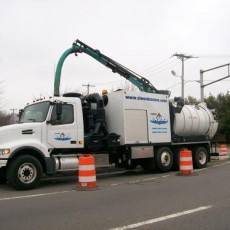Information
What is Hydro Excavation?
 Hydro Excavation is the process of removing or moving soil with pressurized water. An air conveyance or vacuum is then used to transfer the soil or debris to a debris tank. This allows for a non-destructive and more accurate way to excavate soil and locate underground utilities.
Hydro Excavation is the process of removing or moving soil with pressurized water. An air conveyance or vacuum is then used to transfer the soil or debris to a debris tank. This allows for a non-destructive and more accurate way to excavate soil and locate underground utilities.
The popularity of hydro excavation today started with oil and gas industries in Canada. The Canadian contractors were able to see the efficiency of hydro excavation as compared to other methods of daylighting.
The cold weather in Canada often caused the soil to be frozen. This made it harder to excavate using traditional methods. Canadian contractors discovered that using hydro excavation with heated water was a good way to get the job done.
You can find quality hydro excavation companies near you by entering your zip code in our search bar.
How Hydro Excavation Works
Hydro excavation equipment combines high-pressure water an air vacuum. This system cuts through the soils and breaks it up. The vacuum then lifts the slurry from the excavation area. The debris is transferred to a debris tank.
Hydro excavation equipment needs a vacuum source. There are two choices for this, a fan system or a positive displacement blower. A fan system is able to move air in huge amounts. This allows for faster excavations. It is easier to control and operate. This is often lighter and less expensive than the positive displacement blowers.
A displacement blower is able to move air in longer distances than the fan system. Excavation can be done at greater depths but at a slower rate. Most hydro excavation applications can be done more effectively using the fan system.
Hydro excavation equipment combines high-pressure water with air vacuum. This system cuts through the soils and breaks it up. The vacuum then lifts the slurry from the excavation area. The debris is transferred to a debris tank.
Applications
Underground facilities and subsurface utilities are almost always needed for construction. Excavation to lay these utilities is not an easy job and has a lot of risks. The existence of hydro excavation has considerably lessened these risks and it can now be used for several excavation applications.
Hydro excavation is used for line, sign and pole installation and location. It is also used for potholing or daylighting. It allows for less congestion and traffic in the excavation area because the equipment can be positioned at a distance.
Pipe and sewer rehabilitation is another application for hydro excavation. This method reduces risks for any damages to or punctures in the pipes. This eliminates the additional time and cost that repairs require.
By using hydro excavation for landscaping, accurate excavation is done so the surrounding soil is not disturbed. The soil stays compact and strong while the necessary removal and is completed.
Benefits
Hydro excavation brings a number of benefits to the industrial excavation world. It is now the most preferred method of digging because of its efficient and accurate results.
The primary benefit of hydro excavation is that it provides for better damage and safety control when compared with mechanical methods. Since it is accurate, it limits accidents and injuries for laborers as well as other people. It also does a better job of digging.
Using hydro excavation avoids damage to underground pipes, lines and cables. This in turn eliminates the high expenses needed for repairs and restoration. Needing to do fewer repairs means less time to get the job done too. Interrupted utilities bring inconveniences and high costs. This process of excavation is able to minimize damages.
All these bring long run benefits as well. With the safety risks and repairs lessened, hydro excavation also reduces insurance and liability costs. As this process provides better results, a company’s reputation and profitability often increases.
In general, hydro excavation is a method that creates a better service for the customer and that makes life easier for the contractors, the customers and the laborers.
